初中英语语法(中考英语语法)
初中英语语法词法归纳
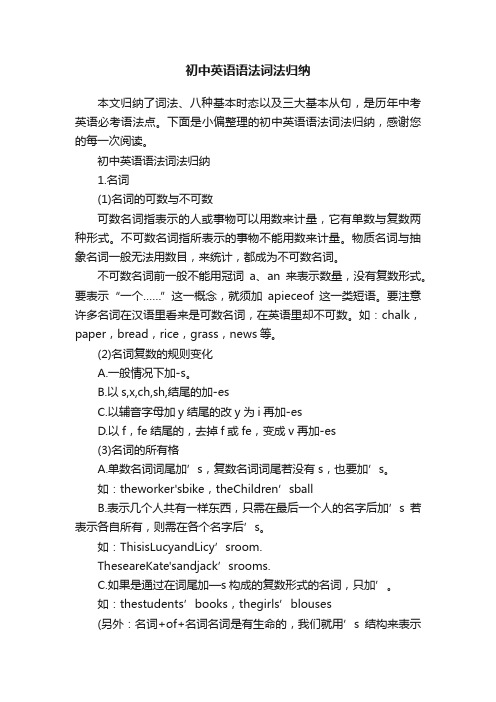
初中英语语法词法归纳本文归纳了词法、八种基本时态以及三大基本从句,是历年中考英语必考语法点。
下面是小偏整理的初中英语语法词法归纳,感谢您的每一次阅读。
初中英语语法词法归纳1.名词(1)名词的可数与不可数可数名词指表示的人或事物可以用数来计量,它有单数与复数两种形式。
不可数名词指所表示的事物不能用数来计量。
物质名词与抽象名词一般无法用数目,来统计,都成为不可数名词。
不可数名词前一般不能用冠词a、an来表示数量,没有复数形式。
要表示“一个……”这一概念,就须加apieceof这一类短语。
要注意许多名词在汉语里看来是可数名词,在英语里却不可数。
如:chalk,paper,bread,rice,grass,news等。
(2)名词复数的规则变化A.一般情况下加-s。
B.以s,x,ch,sh,结尾的加-esC.以辅音字母加y结尾的改y为i再加-esD.以f,fe结尾的,去掉f或fe,变成v再加-es(3)名词的所有格A.单数名词词尾加’s,复数名词词尾若没有s,也要加’s。
如:theworker'sbike,theChildren’sballB.表示几个人共有一样东西,只需在最后一个人的名字后加’s若表示各自所有,则需在各个名字后’s。
如:ThisisLucyandLicy’sroom.TheseareKate'sandjack’srooms.C.如果是通过在词尾加—s构成的复数形式的名词,只加’。
如:thestudents’books,thegirls’blouses(另外:名词+of+名词名词是有生命的,我们就用’s结构来表示所有关系。
如果名词所表示的事物是无生命的,我们就要用名词+of+名词的结构来表示所有关系。
)2.代词人称代词,物主代词,反身代词,指示代词,不定代词(1)人称代词第一人称单数Imemyminemyself复数weusouroursourselves第二人称单数youyouyouryoursyourself复数youyouyouryoursyourselves第三人称单数hehimhishishimselfsheherherhersherselfitititsitsitself复数theythemtheirtheirsthemselves(2)物主代词物主代词的用法:形容词性物主代词后面一定要跟上一个名词;名词性物主代词可作主语、表语、宾语。
(完整版)初中中考英语语法大全
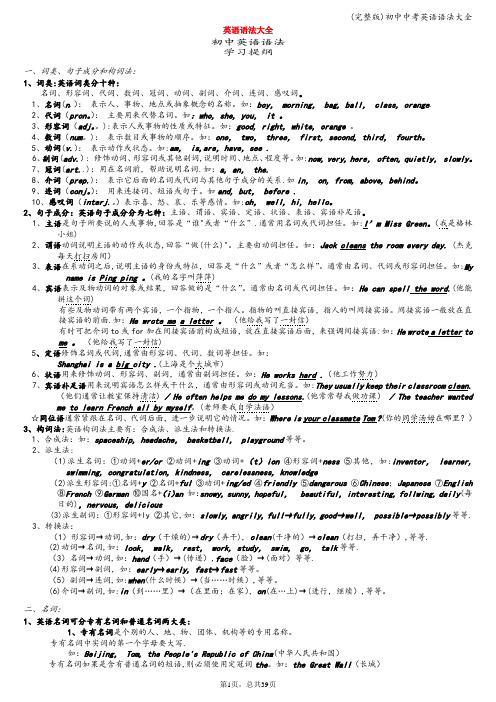
英语语法大全初中英语语法学习提纲一、词类、句子成分和构词法:1、词类:英语词类分十种:名词、形容词、代词、数词、冠词、动词、副词、介词、连词、感叹词。
1、名词(n.):表示人、事物、地点或抽象概念的名称。
如:boy, morning, bag, ball, class, orange.2、代词(pron。
):主要用来代替名词。
如:who, she, you, it 。
3、形容词(adj。
):表示人或事物的性质或特征。
如:good, right, white, orange 。
4、数词(num。
):表示数目或事物的顺序。
如:one, two, three, first, second, third, fourth。
5、动词(v.):表示动作或状态。
如:am, is,are,have,see .6、副词(adv.): 修饰动词、形容词或其他副词,说明时间、地点、程度等。
如:now, very, here, often, quietly, slowly。
7、冠词(art..):用在名词前,帮助说明名词.如:a, an, the.8、介词(prep.):表示它后面的名词或代词与其他句子成分的关系.如in, on, from, above, behind。
9、连词(conj。
):用来连接词、短语或句子。
如and, but, before .10、感叹词(interj.。
)表示喜、怒、哀、乐等感情。
如:oh, well, hi, hello。
2、句子成分:英语句子成分分为七种:主语、谓语、宾语、定语、状语、表语、宾语补足语。
1、主语是句子所要说的人或事物,回答是“谁"或者“什么”.通常用名词或代词担任。
如:I’m Miss Green。
(我是格林小姐)2、谓语动词说明主语的动作或状态,回答“做(什么)"。
主要由动词担任。
如:Jack cleans the room every day. (杰克每天打扫房间)3、表语在系动词之后,说明主语的身份或特征,回答是“什么”或者“怎么样”。
初三英语语法知识点归纳

初中英语语法速记口诀大全很多同学认为语法枯燥难学,其实只要用心并采用适当的学习方法,我们就可以愉快地学会英语,掌握语法规则。
笔者根据有关书目和多年教学经验,搜集、组编了以下语法口诀,希望对即将参加中考的同学们有所帮助。
一、冠词基本用法【速记口诀】名词是秃子,常要戴帽子,可数名词单,须用a或an,辅音前用a,an在元音前,若为特指时,则须用定冠,复数不可数,泛指the不见,碰到代词时,冠词均不现。
【妙语诠释】冠词是中考必考的语法知识之一,也是中考考查的主要对象。
以上口诀包括的意思有:①名词在一般情况下不单用,常常要和冠词连用;②表示不确指的可数名词单数前要用不定冠词a或an,确指时要用定冠词the;③如复数名词表示泛指,名词前有this,these,my,some等时就不用冠词。
二、名词单数变复数规则【速记口诀】单数变复数,规则要记住,一般加s,特殊有几处:末尾字母o,大多加s,两人有两菜,es不离口,词尾f、fe,s前有v和e;没有规则词,必须单独记。
【妙语诠释】①大部分单数可数名词变为复数要加s,但如果单词以/t?蘩/、/?蘩/、/s/发音结尾(也就是单词如果以ch,sh,s,x等结尾),则一般加es;②以o结尾的单词除了两人(negro,hero)两菜(tomato,potato)加es外,其余一般加s;③以f或fe结尾的单词一般是把f,fe变为ve再加s;④英语中还有些单词没有规则,需要特殊记忆,如child—children,mouse—mice,deer—deer,sheep—sheep,Chinese—Chinese,ox—oxen,man—men,woman—women,foot—feet,tooth —teeth。
三、名词所有格用法【速记口诀】名词所有格,表物是“谁的”,若为生命词,加“’s”即可行,词尾有s,仅把逗号择;并列名词后,各自和共有,前者分别加,后者最后加;若为无生命词,of所有格,前后须倒置,此是硬规则。
初中三年英语语法知识归纳最全的中考英语语法大全汇总
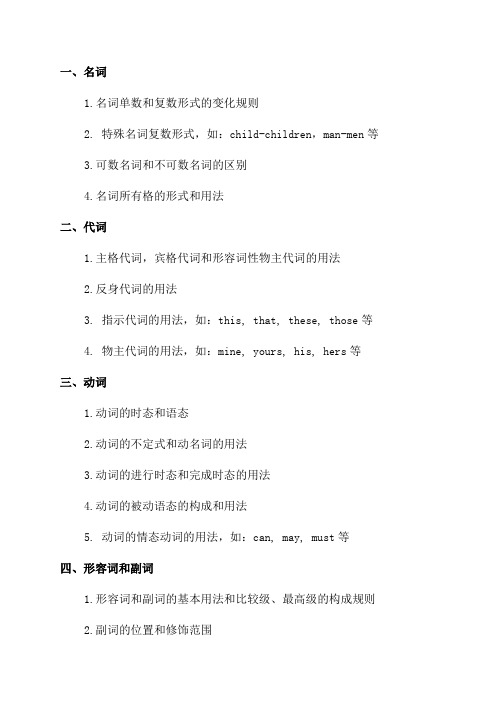
一、名词1.名词单数和复数形式的变化规则2. 特殊名词复数形式,如:child-children,man-men等3.可数名词和不可数名词的区别4.名词所有格的形式和用法二、代词1.主格代词,宾格代词和形容词性物主代词的用法2.反身代词的用法3. 指示代词的用法,如:this, that, these, those等4. 物主代词的用法,如:mine, yours, his, hers等三、动词1.动词的时态和语态2.动词的不定式和动名词的用法3.动词的进行时态和完成时态的用法4.动词的被动语态的构成和用法5. 动词的情态动词的用法,如:can, may, must等四、形容词和副词1.形容词和副词的基本用法和比较级、最高级的构成规则2.副词的位置和修饰范围3. 常见的形容词和副词的用法,如:good, well, bad, badly等五、冠词和介词1.不定冠词和定冠词的用法2.冠词与名词的搭配3.介词的基本用法和常见的介词短语4.常见的介词短语的固定搭配和习惯用法六、从句和状语从句1.定语从句和名词性从句的引导词和用法2.时间状语从句、条件状语从句和目的状语从句的引导词和用法3.原因状语从句和结果状语从句的引导词和用法七、倒装和虚拟语气1.部分倒装和完全倒装的情况和用法2.虚拟语气的用法,包括虚拟条件句和虚拟语气在主句中的表达方式八、陈述句、疑问句和祈使句1.简单陈述句和陈述句的否定形式2.一般疑问句和特殊疑问句的句型和用法3.祈使句的用法和变化形式以上只是初中英语语法知识的一部分,还有许多其他的语法知识点,如条件句、比较结构、间接引语等。
如果你需要进一步的复习材料,可以查阅相关的英语语法书籍或教材,或者向老师寻求帮助。
中考初中英语语法--代词

中考初中英语语法--代词一.人称代词(一)形式二.物主代词(一)形式(二)用法练一练一.写出代词形式二.用所给代词的适当形式填空1. That is not _________ kite. That kite is very small, but _________ is very big. ( I )2. The dress is _________. Give it to _________. ( she )3. Is this _________ watch? (you) No, it’s not _________ . ( I )4. _________ is my brother. ________ name is Jack. Look! Those stamps are _________. ( he )5. _________ dresses are red. (we) What colour are _________? ( you )6. Here are many dolls, which one is _________ ? ( she )7. I can find my toy, but where’s _________? ( you )8. Show _________ your kite, OK? (they)9. I have a beautiful cat. _________name is Mimi. These cakes are _________. ( it )10. Are these ________ tickets? No, ________ are not _________. ________ aren’t here. ( they )11. Shall _________ have a look at that classroom? That is _________ classroom. ( we )12. _________ is my aunt. Do you know _________ job? ( she )13. That is not _________ camera. _________is at home. ( he )14. Where are _________? I can’t find _________. Let’s call _________ parents. ( they )15. _________ don’t know her name. Would you please tell _________. ( we )16. So many dogs. Let’s count _________. ( they )17. I have a lovely brother. _________ is only 3. I like _________ very much. ( he )18. May I sit beside _________? ( you )19.The girl behind _________ is our friend. (she )20. They want a football . Give _______the green one, please. ( they )21.My skirt is better than_________. ( you)22.Mr. Smith is an old friend of_________ ( I).23. Mary, help _________to the bananas, please. ( you )24.They all enjoyed _________ at the party. ( they )25.Mr Wang teaches ______ maths and I teach ______computer.(I)参考答案:二.1.my;mine 2.hers; her 3.your;mine 4.He;His;his 5.Our;yours 6.hers 7.yours 8.them 9.Its ;its 10.their;they; theirs; Theirs 11. we; our 12.She;her 13.his; His 14.they;them;their 15.We;us 16.them 17.He;him 18.you 19.her 20.them 21.yours 22.mine 23.yourself 24. themselves25.me; myself一、英语阅读理解专项练习试卷1.阅读下列短文, 从每题所给的四个选项(A、B、C和D)中选出最佳选项。
中考初中英语语法八大时态总结(附答案)

中考初中英语语法八大时态总结(附答案)初中英语语法八大时态1.结构肯定句式: 主语+动词原形/动词的第三人称单数+其他否定句式: 主语+(助动词) don't/doesn't +动词原形+其他一般疑问句式: Do/Does+主语+动词原形+其他简略回答: (肯)Yes,主语+do/does (否)No,主语+do/does not缩写形式: don't = do not doesn't = does not例句:He often goes swimming in summer.I usually leave home for school at 7 every morning.2.用法1)表示经常的、习惯性的动作或存在的状态,常与表示频度的副词连用。
常用的频度副词有: always、often、 usually、seldom、never、sometimes, every week (day, year, month…), once a week, on Sundays.频度副词在句中通常放在行为动词之前,系动词、助动词之后。
例如: He often goes swimming in summer.I usually leave home for school at 7 every morning.2)表示主语具备的性格、特征和能力等。
例如:All my family love football .My sister is always ready to help others .Ann writes good English but does not speak well.3)表示客观真理、客观存在、自然现象。
例如:The earth moves around the sun.Shanghai lies in the east of China.4)表示按计划或安排好的,或将要发生的动作,可用一般现在时表将来。
初中英语语法知识点总结及练习

一、初中英语语法归纳本文归纳了词法、八种基本时态以及三大基本从句, 是历年中考英语必考语法点。
(一)词法1.名词(1)名词的可数与不可数可数名词指表示的人或事物可以用数来计量, 它有单数与复数两种形式。
不可数名词指所表示的事物不能用数来计量。
物质名词与抽象名词一般无法用数目, 来统计, 都成为不可数名词。
不可数名词前一般不能用冠词a、an来表示数量, 没有复数形式。
要表示“一个……”这一概念, 就须加a piece of这一类短语。
要注意许多名词在汉语里看来是可数名词, 在英语里却不可数。
如:chalk, paper, bread, rice, grass, news等。
(2)名词复数的规则变化A.一般情况下加-s。
B.以s, x, ch, sh, 结尾的加-esC.以辅音字母加y结尾的改y为i再加-esD.以f, fe结尾的, 去掉f或fe, 变成v再加-es(3)名词的所有格A.单数名词词尾加’s, 复数名词词尾若没有s, 也要加’s。
如: the worker's bike, the Children’s ballB.表示几个人共有一样东西,只需在最后一个人的名字后加.s若表示各自所有,则需在各个名字后.s。
如: This is Lucy and Licy’s room.These are Kate's and jack’ s rooms.C.如果是通过在词尾加—s构成的复数形式的名词, 只加’。
如: the students’books, the girls’blouses(另外: 名词+of+名词名词是有生命的, 我们就用’s结构来表示所有关系。
如果名词所表示的事物是无生命的, 我们就要用名词+of+名词的结构来表示所有关系。
)2.代词人称代词, 物主代词, 反身代词, 指示代词, 不定代词(1)人称代词第一人称单数I me my mine myself复数 we us our ours ourselves第二人称单数 you you your yours yourself复数 you you your yours yourselves 第三人称单数 he him his his himselfshe her her hers herselfit it its its itself复数 they them their theirs themselves (2)物主代词物主代词的用法: 形容词性物主代词后面一定要跟上一个名词;名词性物主代词可作主语、表语、宾语。
初中三年英语语法知识归纳最全的中考英语语法大全汇总

一.句子结构及句型1.简单句:由一个主语和一个谓语组成的句子。
2.并列句:由两个或多个相互独立的简单句连接而成的句子。
3.复合句:由一个主句和一个或多个从句连接而成的句子。
4.疑问句:用来提问的句子,常以助动词、系动词或情态动词开头。
5.祈使句:用来表示命令、请求、建议等的句子。
6.感叹句:表示强烈的感情、情绪或意义的句子。
二.时态的用法1.一般现在时:表示经常性或客观事实。
2.一般过去时:表示过去一些时间发生的动作或状态。
3.现在进行时:表示现在进行或暂时的动作。
4.过去进行时:表示过去时进行或暂时的动作。
5.将来时:表示将来要发生的动作或存在的状态。
三.语态的用法1.一般现在时的被动语态:主语是动作的承受者。
2.一般过去时的被动语态:主语是动作的承受者。
3.现在进行时的被动语态:主语是动作的承受者。
4.过去进行时的被动语态:主语是动作的承受者。
四.动词的用法1.及物动词:必须接宾语才能构成完整的意思。
2.不及物动词:不需要接宾语就能构成完整的意思。
3.能愿动词:包括情态动词和行为动词,用于表示能力、愿望、可能性等。
五.名词的用法1.可数名词:表示可以数的事物或物体。
2.不可数名词:表示不可数的抽象概念、物质或一类事物。
3.可数名词的数量表示:使用具体数字、数词、不定代词等。
六.代词的用法1.主格代词:在句子中作主语或表语。
2.宾格代词:在句子中作宾语或介词宾语。
3.物主代词:表示所有关系,用来修饰名词。
4.反身代词:表示动作反映到自己身上。
七.形容词的用法1.表示性质或特征的词汇。
2.修饰名词或代词。
3.用比较级和最高级表示程度或比较。
八.副词的用法1.表示时间、地点、方式、程度等。
2.修饰动词、形容词、副词和句子。
九.介词的用法1.表示时间、地点、方式不同的介词。
2.用于修饰名词或代词。
十.连词的用法1. 并列连词:连接两个并列的分句,如and, but, or等。
2. 从属连词:连接主句和从句,如when, because, if等。
初中英语语法复习:介词(中考总复习)

over
经过、跨越。
我们必须越过那座山。
专题五 介 词
返回目录
介词
含义及用法
例句
方
After you go through the gate, you’ll
位
意为“穿过;通过;经过”,
through
see a beautiful garden. 穿过门之后,
指从空间内部通过。
介
你将看到一个美丽的花园。
升
-He came_______Monday.
A.in
B.on
C.to
D.by
专题五 介 词
8.-Please tell me your decision_______tomorrow morning, OK?
拓
-No problem.I will call you tonight.
展
A.before B.during C.through D.since
(台湾是中国的一部分)
专题五 介 词
返回目录
介词
含义及用法
举例
表示“在……(的平面)上”。 on the desk在桌上
(即: )
on the wall在墙上
方
on 表示A地位于B地的外面且接壤 Hunan Province lies on the west of
。 位
(即: )
Jiangxi Province.湖南省在江西省西 边。(湖南省同江西省接壤)
by
the kids playing outside.简站在窗户
位
靠近
旁边,看着外面玩耍的孩子们。
介
There is a football behind the table.
(中考英语资料)初中英语语法八大时态总结(完整版)含答案
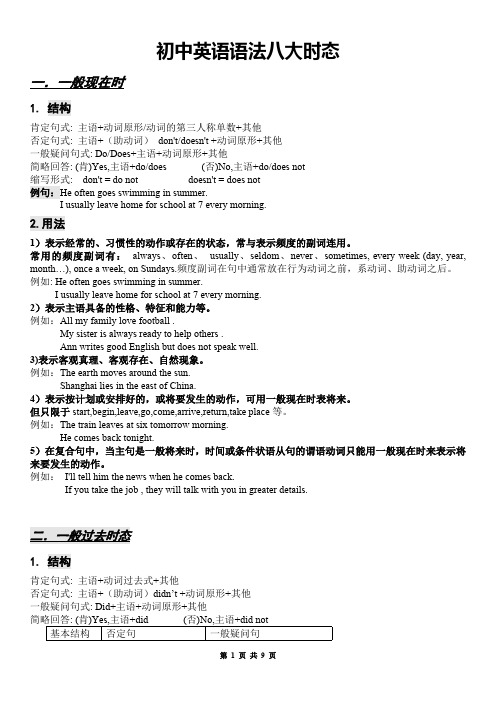
初中英语语法八大时态一.一般现在时1. 结构肯定句式: 主语+动词原形/动词的第三人称单数+其他否定句式: 主语+(助动词)don't/doesn't +动词原形+其他一般疑问句式: Do/Does+主语+动词原形+其他简略回答: (肯)Yes,主语+do/does (否)No,主语+do/does not缩写形式: don't = do not doesn't = does not例句:He often goes swimming in summer.I usually leave home for school at 7 every morning.2.用法1)表示经常的、习惯性的动作或存在的状态,常与表示频度的副词连用。
常用的频度副词有:always、often、usually、seldom、never、sometimes, every week (day, year, month…), once a week, on Sundays.频度副词在句中通常放在行为动词之前,系动词、助动词之后。
例如: He often goes swimming in summer.I usually leave home for school at 7 every morning.2)表示主语具备的性格、特征和能力等。
例如:All my family love football .My sister is always ready to help others .Ann writes good English but does not speak well.3)表示客观真理、客观存在、自然现象。
例如:The earth moves around the sun. Shanghai lies in the east of China.4)表示按计划或安排好的,或将要发生的动作,可用一般现在时表将来。
初中英语重点语法

初中英语重点语法初中英语语法知识点总结:1.不可数名词用法a) 不可数名词前一般不加冠词,尤不加不定冠词:若加a(an)则使之具体化了。
如:have a wonderful time.b) 不可数名词作主语,谓语动词用第三人称单数形式。
c) 不可数名词一般无复数形式。
部分物质名词在表不同类别时,可用复数形式。
如:fishes(各种各样的鱼), newspapers(各种报纸), waters(河湖、海水), snows(积雪)……d) 有些抽象名词也常用复数,变为可数的具体的事物。
如:times 时代,works 著作,difficulties 困难e) 在表数量时,常用“of”词组来表示。
如:a glass of milk, a cup of tea, two pieces of paper….2.冠词基本用法【速记口诀】名词是秃子,常要戴帽子,可数名词单,须用a或an,辅音前用a,an在元音前,若为特指时,则须用定冠,复数不可数,泛指the不见,碰到代词时,冠词均不现。
【妙语诠释】冠词是中考必考的语法知识之一,也是中考考查的主要对象。
以上口诀包括的意思有:①名词在一般情况下不单用,常常要和冠词连用;②表示不确指的可数名词单数前要用不定冠词a或an,确指时要用定冠词the;③如复数名词表示泛指,名词前有this,these,my,some等时就不用冠词。
3.名词单数变复数规则【速记口诀】单数变复数,规则要记住,一般加s,特殊有几处:/s/结尾,es不离后,末尾字母o,大多加s,两人有两菜,es不离口,词尾f、fe,s前有v和e;没有规则词,必须单独记。
【妙语诠释】①大部分单数可数名词变为复数要加s,但如果单词以t/s等发音结尾(也就是单词如果以ch,sh,s,x等结尾),则一般加es;②以o结尾的.单词除了两人(negro,hero)两菜(tomato,potato)加es外,其余一般加s;③以f或fe结尾的单词一般是把f,fe变为ve再加s;④英语中还有些单词没有规则,需要特殊记忆,如child―children,mouse―mice,deer―deer,sheep―sheep,Chinese―Chinese,ox―oxen,man―men,woman―women,foot―feet,tooth―teeth。
初中英语语法考点大全(中考必备)
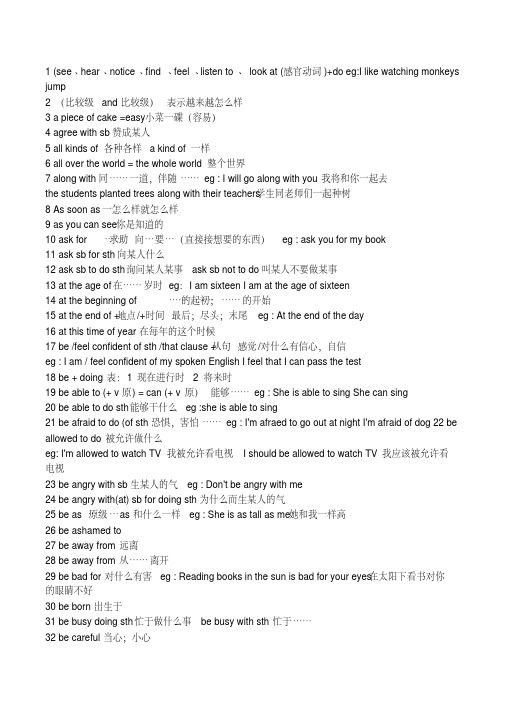
1 (see 、hear 、notice 、find 、feel 、listen to 、look at (感官动词)+do eg:I like watching monkeys jump2 (比较级and 比较级)表示越来越怎么样3 a piece of cake =easy 小菜一碟(容易)4 agree with sb 赞成某人5 all kinds of 各种各样 a kind of 一样6 all over the world = the whole world 整个世界7 along with同……一道,伴随…… eg : I will go along with you我将和你一起去the students planted trees along with their teachers 学生同老师们一起种树8 As soon as 一怎么样就怎么样9 as you can see 你是知道的求助向…要…(直接接想要的东西)eg : ask you for my book10 ask for ……11 ask sb for sth 向某人什么12 ask sb to do sth 询问某人某事ask sb not to do 叫某人不要做某事13 at the age of 在……岁时eg:I am sixteen I am at the age of sixteen的起初;……的开始14 at the beginning of …………15 at the end of +地点/+时间最后;尽头;末尾eg : At the end of the day16 at this time of year 在每年的这个时候17 be /feel confident of sth /that clause +从句感觉/对什么有信心,自信eg : I am / feel confident of my spoken English I feel that I can pass the test18 be + doing 表:1 现在进行时 2 将来时19 be able to (+ v 原) = can (+ v 原)能够…… eg : She is able to sing She can sing20 be able to do sth 能够干什么eg :she is able to sing21 be afraid to do (of sth 恐惧,害怕…… eg : I'm afraed to go out at night I'm afraid of dog 22 be allowed to do 被允许做什么eg: I'm allowed to watch TV 我被允许看电视I should be allowed to watch TV 我应该被允许看电视23 be angry with sb 生某人的气eg : Don't be angry with me24 be angry with(at) sb for doing sth 为什么而生某人的气25 be as…原级…as 和什么一样eg : She is as tall as me 她和我一样高26 be ashamed to27 be away from 远离28 be away from 从……离开29 be bad for 对什么有害eg : Reading books in the sun is bad for your eyes 在太阳下看书对你的眼睛不好30 be born 出生于31 be busy doing sth 忙于做什么事be busy with sth 忙于…… 32 be careful 当心;小心33 be different from…… 和什么不一样34 be famous for 以……著名35 be friendly to sb 对某人友好36 be from = come from 来自eg :He is from Bejing He comes from Bejing Is he from Bejing ? Does he come from Bejing ?37 be full of 装满……的be filled with 充满eg: the glass is full of water the glass is filled with water38 be glad+to+do/从句39 be going to + v(原)将来时40 be good at(+doing) = do well in 在某方面善长, 善于…… 41 be good for 对什么有好处eg : Reading aloud is good for your English42 be happy to do 很高兴做某事43 be helpful to sb 对某人有好处eg : Reading aloud is helpful to you 大声朗读对你有好处Exercising is helpful to your bady 锻炼对你的身体有好处44 be in good health 身体健康45 be in trouble 处于困难中eg : She is in trouble They are in tronble46 be interested in 对某方面感兴趣47 be late for = come late to 迟到eg: Be late for class 上课迟到48 be like 像…… eg : I'm like my mother49 be mad at 生某人的气50 be made from 由……制成(制成以后看不见原材料)51 be made of 由……制成(制成以后还看得见原材料) 52 be not sure 表不确定53 be on a visit to 参观54 be popular with sb 受某人欢迎55 be quiet 安静56 be short for 表**的缩写eg: 陶is short for 陶俊杰57 be sick in bed 生病在床58 be sorry to do sth be sorry for sb eg : I am sorry for you59 be sorry to hear that 60 be sorry to trouble sb eg : I am sorry to trouble you61 be strict in doing sth 严于做某事eg : He's strict in obeying noles62 be strict with sb 对某人要求严格eg: Some students are not strict with them selves 这些学生对自己不严格63 be strict with sb in sth 某方面对某人严格64 be supposed to do 被要求干什么65 be sure 表确定66 be sure of doing sth 对做某事有信心eg: He is sure of winning I am sure of learning English well67 be sure of sth 对做某事有信心eg: I'm sure of my head (my teacher 我相信我的大脑(老师)68 be sure that sth 对做某事有信心eg: I'm suer that he can pass the test 我相信他能通过考试69 be sure to do sth一定会做某事eg: We are sure to pass the test 我们一定会通过这次考试We are sure to learn English well 我们一定能学好英语70 be terrified of + 名/动doing 害怕…… 71 be terrified to do sth 害怕做某事72 be the same as … 和什么一样73 be used to doing sth 习惯做某事eg: My father is used to getting up early 我爸爸习惯早He is used to sleeping in class 他习惯上课睡觉74 be worth doing 值得做什么75 be(feel) afraid to do sth 害怕做某事be afraid of sth 害怕某物be afraid that 丛句76 because+句子because of +短语eg : He was late because he had a headache He was late because of his headache以什么开始什么77 begin to do = start to do 开始做某事start…with…=begin…with… eg : Let's begin the game with the song I begin to go home两者之间78 between…and… 79 borrow sth from sb 向……借…… lend sth to sb ( lend sb sth 借给……什么东西eg : I borrowed a pen from him he lent a pen to me ( he lent me a pen80 both = the same(as) = not different(from) 表相同81 bother 打扰bother sb to do stheg : I'm sorry to bother you ,but can you tell me to way to the station我十分道歉打扰你,但是你能告诉我怎么去车站the problem has been bothering me for weeks 这个问题困扰了我几个周了He's bothering me to lend him money82 by the end of 到……为止83 call sb sth eg : We call him old wang84 care 关心eg : Don't you care about this country's future ?你为什么不关心国家的未来85 catch up with sb 赶上某人86 chat with sb 和某人闲谈take sb to + 地点带某人去某地87 come in 进88 come over to 过来89 come up with 提出eg: Can you come up with a good idea 你能想出一个好办法吗?90 communicate with sb 和某人交流91 consider + doing 考虑做什么eg : Why not consider going to lu zhou 为什么不考虑去泸州?92 dance to 随着……跳舞eg : She likes dancing to the music 她喜欢随着音乐跳舞93 decide to do sth 决定做某事94 do a survey of 做某方面的调查95 do better in 在……方面做得更好96 do wrong 做错97 Don't forget to do sth 不要忘了做某事98 Don't mind +doing /从句/名词不要介意…… 99 each +名(单)每一个…eg : Each student has many books 每一个学生都有一些书100 end up +doing101 enjoy +doing喜欢102 escape from 从……逃跑eg: The prisoners have escaped from the prison犯人从监狱里逃跑出来103 expect to do sth 期待做某事104 fall down 摔下来fall off 从哪摔下来105 fall in love with sb /sth 爱上什么106 far from 离某地远eg : The school is far from my home107 find +it +adj +to do 发现做某事怎么样108 find sb/sth +adj 发现什么怎么样eg : I find the book interesting109 finish 完成+doing(名词)110 fit to sb = be fit for sb 适合某人111 forget to do 没有做而忘了forget doing 做了而又忘了eg: Don't forget to go home I forget closing door从某某到某某eg: From me for her112 from…to… 113 get /have sth down 做完,被(别人)做…eg: I have my hair cut 我理了发(头发被剪了)Tom got his bad tooth pulled out 汤母把他的坏牙拔掉了(被牙医拔掉了)114 get a part-time job= find a part-time job115 get along well with sb = get on well with sb 与某人相处得好116 get along with sb = get on with sb 与某人相处117 get ready for = be ready for为什么而准备eg : I get ready for math I am ready for math 118 get sb in to trouble 给某人麻119 get sb to do sth从某处得到某物120 get…from… 121 give a talk 做报告eg: He is give a tall122 give sth to sb give sb sth 给某人某物123 go fish 钓鱼go swimming 游泳124 go on to do 去做下一件事go on doing 继续做这件事125 go out away from go out of126 go to school 上学(用于专业的)go to the school 去学校(不一定是上学)127 good way to 好方法128 hate to do 讨厌没做过的事hate doing 讨厌做过的事129 have a party for sb 举办谁的晚会130 have a talk 听报告谈一谈131 have been doing 现在完成进行时eg : You have been talking You have been sleeping since 地方)……去过某过地方have gone to …(地方)去了某地还没回来132 have been to …(133 have fun +doing 玩得高兴134 have sth to do 有什么事要做eg: I have a lot of homework to do 我有很多家庭作业要做I have nothing to do 我没什么事情做135 have to do sth 必须做某事136 have trouble (problem) (in) doing sth 做什么事情有麻烦137 have…time +doing时间)…off 放……假eg: I have month off 我请一个月得假138 have…(139 hear sb +do/doing 听见某人做某事/正在做某事140 help a lot 很大用处141 help sb with sth \one's sth 帮助某人某事(某方面)help sb (to) do sth 帮助某人做某事142 hope to do sth 希望做某事143 How about(+doing) = What about(+doing)144 how do you like = what do you think of 你对什么的看法145 if : 是否=wethereg: I don't know if (wether) I should go to the party 我不知道我是否应该去参加晚会He don't know if (wether) we will arrive on time tomorrow morning 他不知道我们明天早上是否能准时到达146 if :如果,假如(全部接一般时态)+条件语态从句eg: I'll go to LuZhou if it does't rain 假如明天不下雨,我就去泸州If they change the plan they will let me know 假如他们要改变计划,他们会让我知道的I'll go to England ,if I have enough money next year 如果我明年由足够的钱,我就要去英国147 in one's opinion = sb think 某人认为148 in some ways 在某些方面149 in the end = finally(adv) 最后什么在什么的北方(north 北sowth 南west 西east 东)150 in the north of… 151 in the sun 在太阳下152 increase 增加eg : They've increased the prece of petrol by 3% 他们把石油价增加了3%the population has increased from 12 million ten years ago to 18 million now153 instead of +(名)代替eg: I'd like an apple instead of a pear 我想要苹果,而不要梨子I like English instead of math 我喜欢英语而不喜欢数学154 introduce sb to sb 介绍某人给某人introduce oneself 自我介绍155 invite sb to do sth 邀请某人做某事156 It takes sb sometime to do sth 做某人花掉某人多少时间eg : It took me 5 minutes to do my homework It takes me half an hour to cook157 It's +adj +for sb to do sth 对某人来说做某事怎么样158 It's +adj +to do 做某事怎么样159 It's +adj for sb 对于某人来说怎么样It's +adj of sb 对某人来说太怎么样160 It's +adj(for sb) to do(对某人来说)做某事怎么样It's +adj of sb to do sth 对某人来说做某事太怎么样eg : It's nice of you to help me with my English161 It's a good idea for sb to do sth 对…… 来说是个好主意162 It's important to sb 对某人来说很重要eg: It's important to me163 It's time to do sth It's time for sth 到了该去做某事的时间eg : It's time to have class It's time for class 该去上课了164 join = take part in 参加165 just now 刚才166 keep +sb /sth +adj /介词短语让什么保持什么样?167 keep out 不让…… 进入168 keep sb adj 让……保持…… eg: I want to keep my mother happy keep healthy 保持健康169 key to +名词表示:某物的钥匙或某题的答案可以是答题或钥匙170 key to… anser to … key取笑…… eg : Don't langh at others We langhed at the joke171 laugh at… 172 learn by oneslfe 自学173 learn from sb 向某人学习eg: We should learn from Lei Feng174 learn to do sth 学做某事175 let sb do sth 让某人做某事176 Let sb down 让某人失望eg :We shouldn't let our farents down 我们不应该让我们的父母失望177 live from :离某地远178 live in +大地方/at +小地方居住在某地eg: I live in LuZhou She lives at XuanTan179 look after = take care of 照顾照看180 lose one's way 谁迷路eg : Lose your way 你迷路181 make a decision to do sth 决定做某事182 make friends with sb 和谁成为朋友eg : I want to make friends with you183 make it early 把时间定的早一点184 make on exhibition of oneself 让某人出洋相185 make sb /n +n 使什么成为什么eg : I made her my step moller I made you my wife186 make sb /sth +adj 使某人(某物)怎么样eg : You must made your bed clean187 make sb /sth adj 使某人/某物怎么样188 make sb do sth 让某人做某事eg : I made him write 我以前让他写189 make up be made up of (被动语态)由……组成190 make…difference to… 191 mind sb to do mind one's doing 介意……做什么192 most +名most of +代193 much too +形容词194 must be 一定195 need +名词196 need sb do sth 需要某人做某事197 need to do (实义动词)need do (情态动词)198 no /neithr of hate to do no /neithr of hate doing199 no +名词200 not anymore = no more 再也不…… eg: He didn't cry any more He cried no more 他再也不哭201 not… (形、副)at all eg: He's not tall at all she doesn't junp far at all202 not…at all 一点都不203 not…either 表否定,也不eg : I don't japanse either I don't have sister, either 我也没有姐姐204 not…until 直到……才…… eg: I didn't sleep until my mother came back The child didn't stop crying until I give her sugar205 offer / provide sb with sth 给某人提供206 offer sb sth ( offer sth to sb 提供什么东西给某人eg : I offer you water (I offer water to you 我给你提供水在谁去那的路上207 on one's way to… 208 on the one hand 一方面on the other hand 另一方面209 on the phone = over the phone 用电话交谈210 on time 准时in time 及时211 one day =some day =someday 一天,有一天212 one of +可数名词的复数形式213 one to another 一个到另一个214 over and over agin 一遍又一遍的eg : He cleaned the floor over and over agin215 part-time job 兼职工作fall-time job 全职工作付……钱pay the bill 开钱,付钱216 pay for… 217 please +do218 please help yourself219 pleased with sb220 pool into = pore into221 practice +doing 练习做某事222 prefer sth to sth 相对……更喜欢…… eg : I prefer physics to chemisty 在物理和化学中,我更喜欢物理prefer doing to sth 更喜欢去做…不愿意去做… eg: He prefers riding a bike to diving 他更喜欢骑自行车,不开小车prefer to do sth rather than do sth 宁愿做…也不愿eg: My unde prefers to buy a now car rather than repaiv the used one 我叔叔更喜欢买新的车,也不去修旧车prefer sb not to do sth 更愿意… eg: I prefer her not to come 我不喜欢她不来223 pretend to do sth 装着去做什么pretend that 从句eg : The two cheats pretended to be working very hard 这两个骗子装着努力工作He pretended that he did not know the answer 他装着不知道答案宁可……也不…… 224 rather…thaneg : I would rather be a doctor than a teacher 我愿肯当医生,也不当老师He likes dogs rather than cats 他喜欢狗,不喜欢猫225 regard…as 把……当作…… eg: Please give my best regards to your family 请带我向你的家人我最好的问候I regard you as my friend 我把你当作我的朋友He shows little regard for others 他不爱关心别人226 remid sb about sth 提醒某人什么事remid sb to do sth 提醒某人做某事eg : he remids me about cooking (he remids me to cook 他提醒我做饭227 remid sb of sth 使某人想起什么eg : the pictures remind me of my school days 这照片使我想起了我的学校the words that (which) the teacher talke to remind me of my mother228 return sth to sb 还什么东西给某人229 say to oneself 对自己说230 say to sb 对某人说231 sb spend somemoney on sth 花了多少钱在某事上232 sb spend sometime with sb 花了多少时间陪谁233 sb spend sometime(in) doing sth 花了多少时间做某事234 sb with sb +is sb and sb +are235 see sb do 看见某人做过某事see sb doing 看见某人正在做某事236 seem to do/be +adj 显得怎么样eg : You seem to be tired You seem to be happy237 send +sb sth 送给某人某物238 send…to…把什么寄到哪里去?239 shock 使……震惊eg : Oh , It's only you ! You give me a shock 啊,是你呀!吓我一跳240 show sb sth 向某人展示某物eg : I show her the book.241 show sb sth = show sth to sb 拿什么东西给某人看eg: Show me your pen Show your pen to me242 show sth to sb 向某人展示某物eg : I show the book to her.一些……另一些…… 243 some…others… 从……开始从……开始begin…with… 244 start…with… 245 stay away from 远离…… 。
初中英语 语法知识总结(含答案)
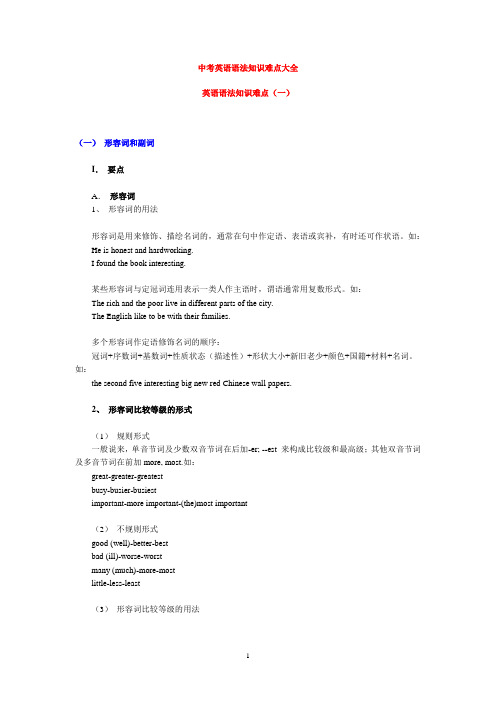
中考英语语法知识难点大全英语语法知识难点(一)(一)形容词和副词I.要点A.形容词1、形容词的用法形容词是用来修饰、描绘名词的,通常在句中作定语、表语或宾补,有时还可作状语。
如:He is honest and hardworking.I found the book interesting.某些形容词与定冠词连用表示一类人作主语时,谓语通常用复数形式。
如:The rich and the poor live in different parts of the city.The English like to be with their families.多个形容词作定语修饰名词的顺序:冠词+序数词+基数词+性质状态(描述性)+形状大小+新旧老少+颜色+国籍+材料+名词。
如:the second five interesting big new red Chinese wall papers.2、形容词比较等级的形式(1)规则形式一般说来,单音节词及少数双音节词在后加-er; --est 来构成比较级和最高级;其他双音节词及多音节词在前加more, most.如:great-greater-greatestbusy-busier-busiestimportant-more important-(the)most important(2)不规则形式good (well)-better-bestbad (ill)-worse-worstmany (much)-more-mostlittle-less-least(3)形容词比较等级的用法①表示两者的比较,用形容词的比较级+than. 如:He is cleverer than the other boys.This one is more beautiful than that one.②表示两者以上的比较,用"the +形容词最高级(+名词)+of(in) …"如:He is the cleverest boy in his class.③表示两者是同等程度,用"as +形容词原级+as". 如:He is as tall as I.I have as many books as you.④越… 越…例如:The more I learn, the happier I am.⑤You can never be too careful. 越小心越好又如:You can never praise the teacher too highly.你怎么赞扬这个老师也不过分。
(完整版)初中英语语法知识点归纳
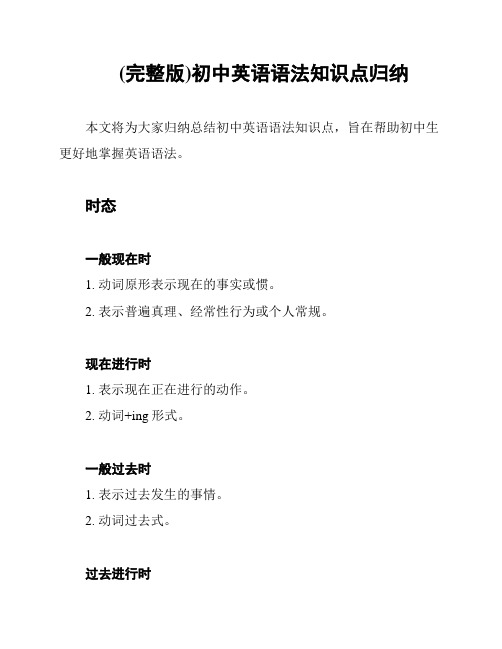
(完整版)初中英语语法知识点归纳本文将为大家归纳总结初中英语语法知识点,旨在帮助初中生更好地掌握英语语法。
时态一般现在时1. 动词原形表示现在的事实或惯。
2. 表示普遍真理、经常性行为或个人常规。
现在进行时1. 表示现在正在进行的动作。
2. 动词+ing形式。
一般过去时1. 表示过去发生的事情。
2. 动词过去式。
过去进行时1. 表示过去某个时间正在进行的动作。
2. was/were + 动词+ing形式。
一般将来时1. 表示将来的动作或状态。
2. will/shall + 动词原形。
语态主动语态1. 表示主语是动作的执行者。
2. 主语 + 动词原形。
被动语态1. 表示主语是动作的承受者。
2. be + 过去分词。
比较级与最高级比较级1. 用于比较两个人或物。
2. 形容词 + er。
最高级1. 用于比较三个或更多人或物。
2. 形容词 + est。
祈使句祈使句1. 表示请求、命令、建议或劝告。
2. 动词原形。
倒装句倒装句1. 将助动词或情态动词提前至主语之前。
2. 系动词be的倒装句:is/am/are/was/were + 主语。
直接引语与间接引语直接引语1. 直接引用他人的话。
2. 用引号将原话括起来。
间接引语1. 用自己的话转述他人的话。
2. 没有引号。
以上是初中英语语法的主要知识点归纳。
希望这份文档能够帮助到您更好地学习和掌握英语语法知识。
初中英语语法大全(精华版)

初中英语语法大全(精华版)一、动词时态1. 一般现在时:表示经常性、习惯性的动作或状态。
例如:He goes to school bike every day.(他每天骑自行车上学。
)2. 一般过去时:表示过去某个时间里发生的动作或存在的状态。
例如:She visited her grandparents last weekend.(她上周末去看望了她的祖父母。
)3. 一般将来时:表示将来要发生的动作或状态。
例如:We will have a sports meeting next month.(下个月我们将举行一场运动会。
)4. 现在进行时:表示正在进行的动作或状态。
例如:The boy is reading a book in the library.(这个男孩正在图书馆看书。
)5. 过去进行时:表示过去某个时刻正在进行的动作或状态。
例如:They were watching TV when I called them last night.(昨晚我给他们打电话时,他们正在看电视。
)6. 现在完成时:表示过去发生的动作对现在造成的影响或结果。
例如:I have finished my homework.(我已经完成了我的家庭作业。
)二、名词1. 名词的分类:名词分为可数名词和不可数名词。
可数名词有单数和复数形式,不可数名词没有复数形式。
2. 名词的数:可数名词的复数形式通常在词尾加s或es。
例如:books(书),pencils(铅笔)。
3. 名词的所有格:表示某物属于某人或某事物的关系。
例如:Tom's book(汤姆的书),the teacher's desk(老师的桌子)。
三、冠词1. 不定冠词:a和an。
a用于辅音音素开头的单词前,an用于元音音素开头的单词前。
例如:a dog(一条狗),an apple(一个苹果)。
2. 定冠词:the。
表示特指,指某个特定的人或事物。
初中中考英语语法整理
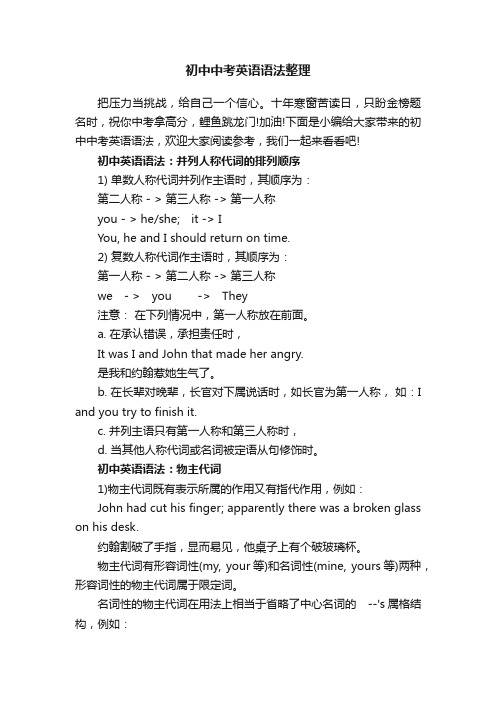
初中中考英语语法整理把压力当挑战,给自己一个信心。
十年寒窗苦读日,只盼金榜题名时,祝你中考拿高分,鲤鱼跳龙门!加油!下面是小编给大家带来的初中中考英语语法,欢迎大家阅读参考,我们一起来看看吧!初中英语语法:并列人称代词的排列顺序1) 单数人称代词并列作主语时,其顺序为:第二人称 - > 第三人称 -> 第一人称you - > he/she; it -> IYou, he and I should return on time.2) 复数人称代词作主语时,其顺序为:第一人称 - > 第二人称 -> 第三人称we - > you -> They注意:在下列情况中,第一人称放在前面。
a. 在承认错误,承担责任时,It was I and John that made her angry.是我和约翰惹她生气了。
b. 在长辈对晚辈,长官对下属说话时,如长官为第一人称,如:I and you try to finish it.c. 并列主语只有第一人称和第三人称时,d. 当其他人称代词或名词被定语从句修饰时。
初中英语语法:物主代词1)物主代词既有表示所属的作用又有指代作用,例如:John had cut his finger; apparently there was a broken glass on his desk.约翰割破了手指,显而易见,他桌子上有个破玻璃杯。
物主代词有形容词性(my, your等)和名词性(mine, yours等)两种,形容词性的物主代词属于限定词。
名词性的物主代词在用法上相当于省略了中心名词的--'s属格结构,例如:Jack's cap 意为 The cap is Jack's.His cap 意为 The cap is his.2) 名词性物主代词的句法功能a. 作主语,例如:May I use your pen? Yours works better.我可以用一用你的钢笔吗? 你的比我的好用。
- 1、下载文档前请自行甄别文档内容的完整性,平台不提供额外的编辑、内容补充、找答案等附加服务。
- 2、"仅部分预览"的文档,不可在线预览部分如存在完整性等问题,可反馈申请退款(可完整预览的文档不适用该条件!)。
- 3、如文档侵犯您的权益,请联系客服反馈,我们会尽快为您处理(人工客服工作时间:9:00-18:30)。
初中英语语法(中考英语语法)
首先从几个简单的句子来分析什么是主谓宾定状补。
请看下面句子
A.主语
1.His father works in a factory.
2.Seeing a film is better than Listening to the radio.
(It’s no use telling him the news.)
3.To learn English well is not easy.
(It is not easy to learn English well.)
4.What he told me yesterday was to study harder.
5.When they will come hasn’t been decided.
6.That we need more money is quite obvious.
(It’s a pity that you have missed such a good film.)
B.宾语
1.He bought some books yesterday.
2.Thank you for coming.
3.I’ll send him the book.
4.The news made him feel very sad.
5.I don’t know whether he’ll come or not.
6.Let’s see how we can do it.
7.
C.谓语
1.He wants to go to buy a ticket.
2.There are a lot of boys on the playground playing football.
3.He went out of the room quickly, followed by his dog.
4.After telling him the news, we began to eat the bananas served by his wife.
D.定语
1.The American teacher spoke so slowly that everyone in the class could follow him.
2. A man called Jack wrote this book.
3.The woman sitting there, watching TV, is our English teacher.
4.The meeting to be held next Monday will be important.
5.The only reason why he did it was that he needed money.
E.状语
1.I get up at 6:00 in the morning.
2.I was writing when he came in.
主语表明这句话说的是谁和什么,主语主要由名词、代词或相当于名词的单词,短语或从句充当。
一. 名词作主语
David arrived last night. 大卫昨晚到达。
Pride goes before a fall. 骄必败。
二. 代词作主语
Who is speaking, please? (在电话中)请问您是谁?
That's OK. 这没问题。
三. 数词作主语
Two will be enough. 两个就够了。
Two-thirds of the workers are women. 三分之二的工人是女工。
四. ing形式作主语
Skating is good exercise. 溜冰是很好的运动。
Looking up all the new words in the dictionary took him a lot of time. 从字典里查所有的生词花费了他许多时间。
五. 不定式作主语
To translate this ideal into reality needs hard work.
把理想转变成现实需要辛勤的劳动。
六. 名词化的形容词作主语
The blind and the lame are well cared for in our country.
在我们国家,盲人和肢残人受到很好的照顾。
The unemployed usually lead a hard life.
失业的人生活一般很困难。
七. 短语作主语
How to do well is an important question.
如何把这件事做好是一个重要问题。
Early to bed and early to rise makes a man healthy.
早睡早起身体好。
八. 从句作主语
What has happened proves that our policy is right.
发生的一切证明我们的政策是对的。
Whether we'll go depends on the weather.
我们是否去要看天气。
谓语说明主语的动作或状态。
谓语动词一般在主语之后。
Some children asked for cold drinks.
有些孩子要喝冷饮。
I shall go to see him tomorrow.
明天我要去看他。
I must ask her to teach me to swim.
我一定得请她教我游泳。
宾语一般用在及物动词的后面,表示行为动词所涉及的对象。
一. 名词作宾语
Show your passport, please.
请出示护照。
二. 代词作宾语
He didn't say anything.
她什么也没说。
三. 数词作宾语
How many do you want? - I want two.
你要几个?-我要两个。
四. 名词化的形容词作宾语
They sent the injured to hospital.
他们把伤员送到医院。
五. 不定式或ing形式作宾语
The asked to see my passport.
他们要求看我的护照。
I enjoy working with you.
我和你们一道工作很愉快。
六. 从句作宾语
Did you write down what he said?
你把他的话记下了没有?
定语
形容词作定语
He's a tall man.
他是个高个子的男子。
名词作定语
There are a lot of banana trees on the island. 岛上有许多香蕉树。
数词作定语
Three thousand people watched the game. 三万人观看了球赛。
限定词作定语
Many men are working there.
许多人在那儿工作。
-ing形式作定语
There is a swimming pool near our school. 我们学校附近有一个游泳池。
-ed分词作定语
frozen food 冷冻食品
fallen leaves 落叶
状语
副词作状语
Don't drive so fast.
别开得这么快。
介词短语作地点状语
We live in Hangzhou.
我们住在杭州。
名词作状语
The meeting lasted an hour.
会议开了一个小时。
接在动词之后对主语起着解释或描述作用的成分,叫作主补。
形容词作主补
They married young. 他们结婚时还年轻。
He died happy. 他怀着幸福的心情死去。
No man is born wise. 没有生而知之。
ed分词作主补
He came in drunk. 他走进来的时候醉醺醺的。
名词作主补
He died a poor man. 他死时很穷。
He died a millionaire. 他死的时候是个百万富翁。
宾补
适用宾补的句型:
主语+谓语+宾语+宾补.宾补对宾语加以解释或描述。
以下成分可以充当宾补:名词,代词,形容词,副词,ing形式,ed分词,不定式,介词短语,名词性从句。
名词作宾补
I consider him a gentleman.
代词作宾补
Whom do you think me? (Whom是宾补)
形容词作宾补
Wash your hands clean.
副词作宾补
I found him out.
-ing形式作宾补
They left me wait.
-ed分词作宾补
I heard my name called.
不定式作宾补
I thought him to be a good man.
介词短语作宾补
Make yourself at home.
名词性从句作宾补
His wife has made him what he is .。
